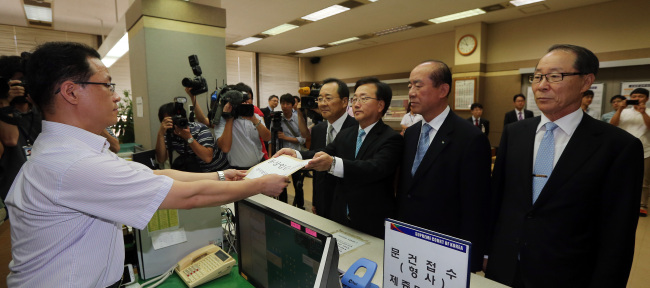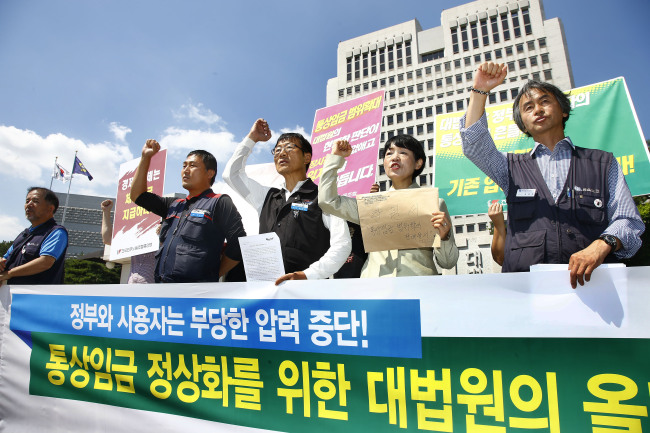Tension between labor and business is sharply increasing over the controversial ordinary salary system as the nation’s top court gears up to rule on litigations over the complicated wage rule.
The Supreme Court will hold its first-ever open hearing Thursday in two lawsuits over the on-going wage disputes. The court plans to have all member judges involved and make a final verdict over the contentious issue by the end of the year.
The wage dispute centers on whether to include bonuses, if paid regularly, as part of ordinary pay. Ordinary pay is used as the base to calculate overtime, nighttime and holiday pay and affects the amount offered in severance packages. Bonuses are not currently included in ordinary pay.

 |
Ahead of a Supreme Court hearing on Thursday over the ordinary wage system, the Korean Confederation of Trade Unions holds a rally outside the court on Wednesday (bottom photo) and representatives of the Korea Chamber of Commerce and Industry submit a petition to the court Tuesday to make their respective cases. (Yonhap News) |
Labor circles and businesses have been in a war of nerves, striving to win over the public, the court and political parties.
On Tuesday, the Korea Chamber of Commerce and Industry, one of the five major business groups here, filed a petition with the Supreme Court, urging the top court to make a “fair” decision. In the statement, the KCCI stressed that the court’s decision would have a huge impact on the Korean economy and entire nation.
Companies in Korea would have to pay out a combined, additional 38 trillion won ($34.4 billion) if bonuses were to be included in the ordinary wage, undermining their export competitiveness, they claimed.
To this, the Korean Confederation of Trade Unions, one of two major umbrella union groups, urged the court to “ignore any political interference or pressure.”
Currently, more than 160 civil cases are being processed after the Supreme Court ruled in favor of labor unions in March last year.
Since the ruling, labor unions have filed a string of lawsuits against companies and are demanding that the government revise the labor law so that ordinary pay includes all types of bonuses.
Businesses have fiercely opposed the move, citing increased costs. They say the wage scheme could become a major obstacle to businesses operating in the country and that it could spread to small companies down the road.
As the issue further sparked a heated debate in the labor, business and political circles, the top court decided to make a full-member decision. The top court holds such trials when the cases are important enough to set a precedent for other cases down the road. The decision, made by the 13 Supreme Court justices, directly effects all local courts.
The conflict between labor and business is likely to deepen as the parliament plans to introduce a new law regarding ordinary pay. Rep. Hong Young-pyo of the main opposition Democratic Party, submitted a bill to revise the law to classify all bonuses as ordinary pay.
The government also plans to revise the current law on ordinary wages. An advisory committee on wages has reportedly finalized its suggestion for the Ministry of Employment and Labor. Based on the committee’s suggestion, the ministry is expected to begin discussion on the issue at a tripartite panel of labor, management and government and seek social consensus afterward.
The country’s controversial wage system has sparked a heated debate in and out of the country.
Daniel Akerson, chairman and chief executive officer of General Motors, which operates a subsidiary in Korea, raised the issue when he and other American businessmen met with President Park Geun-hye during her U.S. visit in May. As Akerson cited the wage issue as a key barrier to investment in Korea, Park said the Korean government would reassess the wage rule.
By Cho Chung-un (
christory@heraldcorp.com)






![[Exclusive] Hyundai Mobis eyes closer ties with BYD](http://res.heraldm.com/phpwas/restmb_idxmake.php?idx=644&simg=/content/image/2024/11/25/20241125050044_0.jpg)

![[Herald Review] 'Gangnam B-Side' combines social realism with masterful suspense, performance](http://res.heraldm.com/phpwas/restmb_idxmake.php?idx=644&simg=/content/image/2024/11/25/20241125050072_0.jpg)
